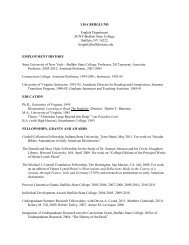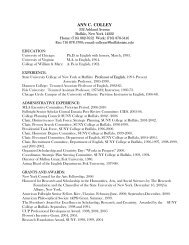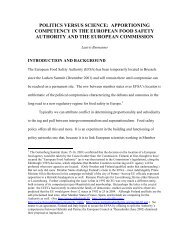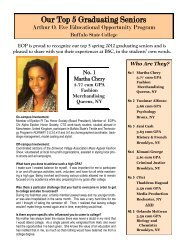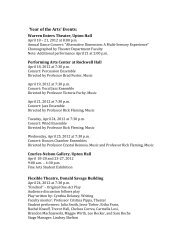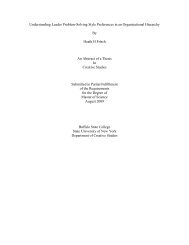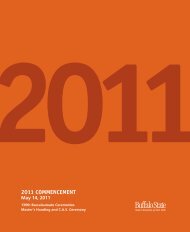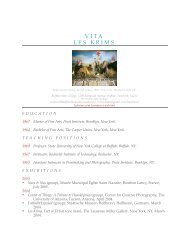Arts - Buffalo State College
Arts - Buffalo State College
Arts - Buffalo State College
You also want an ePaper? Increase the reach of your titles
YUMPU automatically turns print PDFs into web optimized ePapers that Google loves.
Education<br />
Aligning Social Studies Curriculum With<br />
Science, Math, and the <strong>Arts</strong> To Develop<br />
Critical Thinkers<br />
Danielle Huber, EDU 590: Educational Web Design<br />
Faculty Mentor: Professor Coralee Smith, Elementary Education<br />
and Reading<br />
The purpose of this study was to find out if there is a<br />
correlation between students that think critically to their exposure<br />
to inquiry-based instruction via social studies aligned with the arts,<br />
mathematics, and science. The number of teachers that collaborate<br />
and/or are willing to collaborate with colleague teachers outside<br />
of their specialty/ content area was also examined. The teacher<br />
participants indicating that their students can think critically<br />
relative to the frequency of integrated critical thinking instruction<br />
was measured. The results obtained indicate that teachers do utilize<br />
inquiry-based instruction in their classrooms some of the time.<br />
The data also significantly shows that teachers find this form of<br />
instruction vital to developing critical thinkers. Finally, the research<br />
suggests that teachers do collaborate outside of their specialty/<br />
content area, but they do not align curriculum. Although they do<br />
not align curriculum they do see the need/ benefits of doing so.<br />
These results led to the conclusion that teachers understand the<br />
significance of instructing to develop critical thinkers, but not all are<br />
effectively executing the instruction or they are not doing it at all.<br />
Additional information may be accessed at 2ndGradeSocialStudies.<br />
wordpress.com.<br />
Presentation Type and Session: Poster III<br />
Are There Universal Teaching Strategies<br />
In the Learning and Teaching of<br />
Mathematics?<br />
Jenna Fanara, Meaghan Angelhow, Kelly Jasinski, Eric<br />
Gensler, Holli Diez, Scott Allen, Jessica Andres, Kylie<br />
Catanzaro, Angela Frost, and AnnMarie Henesey, EDU 312:<br />
The Teaching of Mathematics and Science in the Elementary School<br />
Faculty Mentor: Professor Hibajene Shandomo, Elementary<br />
Education and Reading<br />
Our qualitative study involved a comparison of teaching<br />
strategies that are used in the learning and teaching of mathematics<br />
at a professional development school between one public school in<br />
<strong>Buffalo</strong>, New York and a government or public school in Lusaka,<br />
Zambia. We are using several techniques in our study including<br />
participant observations, field observations, and interviews to collect<br />
data from a five classrooms in which each one of us will work as<br />
teacher candidates. Our findings should help us become effective<br />
teachers for students from different cultural backgrounds, students<br />
who are English language learners, and those students who may<br />
be mathematically gifted. It is our belief that as we become more<br />
culturally diverse and adopt new strategies of teaching, we will help<br />
every child we teach to reach mathematical literacy.<br />
Presentation Type and Session: Poster III<br />
Assessing Student Learning of Fourth<br />
Graders Using Inquiry Based Science Kits<br />
Jennifer Kimpton and Christopher Rademacher, SCI 694:<br />
Research in Science Education<br />
Faculty Mentors: Professor Catherine Lange, Earth Sciences and<br />
Science Education and Professor Joseph Zawicki, Earth Sciences<br />
and Science Education<br />
Inquiry in the classroom can take many forms. Some<br />
pedagogical practices used in inquiry-based lessons include guided<br />
instruction, free-range exploration, lab activities, gather-analyzeinterpret<br />
activities, and science kits. This study investigated the use<br />
of science kits in fourth grade classrooms, and the assessed the<br />
impact the kit use on student learning in science. The topics covered<br />
by these kits included: butterflies, magnets, electrical circuits,<br />
land and water, mammals, from seed to plant, among others. The<br />
typical science kit included instructional materials, student response<br />
booklets, teacher manuals, assessment materials, and lesson plans.<br />
They are widely used throughout the region in elementary and<br />
middle school classrooms. The kits are ordered by school districts<br />
and teachers are required to implement the kits as part of the regular<br />
instructional day. This study measured the student learning from the<br />
land and water science kit using: attitudinal surveys, teacher created<br />
assessments, kit developed assessments, student response booklets,<br />
a ‘time on task’ observation, and fourth grade state assessment<br />
scores (from previous school years). An analysis of the data will<br />
be presented. The initial data support the conclusion that using<br />
inquiry based science kits positively impacts the science learning of<br />
fourth graders who utilized the kits. Additional data will be collected<br />
to verify and to expand upon our conclusions. Given the lack of<br />
teacher choice in the use of the kits and the lack of data supporting<br />
the effectiveness of kit use, this research will provide valuable<br />
information for districts planning for future resource allocation and<br />
for teachers seeking to improve instructional delivery.<br />
Presentation Type and Session: Oral – Education<br />
Assessing Urban Outdoor Education<br />
Efficacy<br />
Scott Cerny, John Miller, and Sean Collins, SCI 690: Outdoor<br />
Education Master’s Project<br />
Faculty Mentors: Professor Joseph Zawicki, Earth Sciences and<br />
Science Education and Professor Catherine Lange, Earth Sciences<br />
and Science Education<br />
Our project assessed the impact of both in-school and<br />
shipboard outdoor education learning experiences on urban<br />
student understandings, behaviors and attitudes. The in-school<br />
program included six interactive lessons; the shipboard experience<br />
included a day-long sailing experience on the Spirit of <strong>Buffalo</strong>.<br />
63




